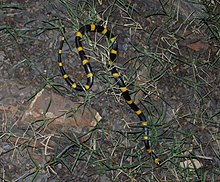Geophis sartorii
| Geophis sartorii | |
|---|---|

| |
| Scientific classification | |
| Domain: | Eukaryota |
| Kingdom: | Animalia |
| Phylum: | Chordata |
| Class: | Reptilia |
| Order: | Squamata |
| Suborder: | Serpentes |
| Family: | Colubridae |
| Genus: | Geophis |
| Species: | G. sartorii
|
| Binomial name | |
| Geophis sartorii (Cope, 1863)
| |
| Synonyms[2] | |
| |
Geophis sartorii, also known commonly as Sartorius' snail-sucker and the terrestrial snail sucker, is a species of snake in the family Colubridae. The species is native to southern North America and Central America. There are two recognized subspecies.
Etymology
[edit]The specific name, sartorii, is in honor of German-born Mexican naturalist Christian Carl Wilhelm Sartorius.[3]
Geographic range
[edit]G. sartorii is found in southeastern Mexico, and in Belize, Costa Rica, El Salvador, Guatemala, Honduras, and Nicaragua.[2]
Habitat
[edit]The preferred natural habitat of G. sartorii is forest, at altitudes from sea level to 2,000 m (6,600 ft).[1]
Description
[edit]G. sartorii may attain a snout-to-vent length of 48 cm (19 in) with a tail length of 14 cm (5.5 in). The body is black, with 16–20 narrow rings, which are yellowish to reddish in color.[4]
Diet
[edit]G. sartorii preys upon snails.[1]
Reproduction
[edit]Mimicry
[edit]G. sartorii mimicks Micrurus elegans, a species of venomous coral snake with which it is sympatric.[2]
Subspecies
[edit]Two subspecies are recognized as being valid, including the nominotypical subspecies.[2]
- Geophis sartorius macdougalli (H.M. Smith, 1943)
- Geophis sartorii sartorii (Cope, 1863)
Nota bene: A trinomial authority in parentheses indicates that the subspecies was originally described in a genus other than Geophis.
References
[edit]- ^ a b c Lee J, Mandujano RC, Townsend J, Luque I, Ariano D (2020). Tropidodipsas sartorii. The IUCN Red List of Threatened Species 2020. Accessed on 17 March 2023.
- ^ a b c d e Species Geophis sartorii at The Reptile Database www.reptile-database.org.
- ^ Beolens, Bo; Watkins, Michael; Grayson, Michael (2011). The Eponym Dictionary of Reptiles. Baltimore: Johns Hopkins University Press. xiii + 296 pp. ISBN 978-1-4214-0135-5. (Sibon sartorii, p. 233).
- ^ Boulenger GA (1894). Catalogue of the Snakes in the British Museum (Natural History). Volume II., Containing the Conclusion of the Colubridæ Aglyphæ. London: Trustees of the British Museum (Natural History). (Taylor and Francis, printers). xi + 382 pp. + Plates I–XX. (Tropidodipsas sartorii, pp. 296–297).
Further reading
[edit]- Cope ED (1863). "Descriptions of new American SQUAMATA in the Museum of the Smithsonian Institution, Washington". Proceedings of the Academy of Natural Sciences of Philadelphia 15: 100–106. (Tropidodipsas sartorii, new species, p. 100).
- De Luna, Manuel; García-Barrios, Roberto (2022). "GEOPHIS SARTORII (Terrestrial Snail Sucker). DIET". Herpetological Review 53 (3): 509–510.
- Goldberg SR (2017). "TROPIDODIPSAS SARTORII (Terrestrial Snail Sucker). REPRODUCTION". Herpetological Review 48 (4): 869.
- Grünwald CI, Toribio-Jiménez S, Montaño-Ruvalcaba C, Franz-Chávez H, Peñaloza-Montaño MA, Barrera-Nava EY, Jones JM, Rodriguez CM, Hughes IM, Strickland JL, Reyes-Velasco J (2021). "Two new species of snail-eating snakes of the genus Tropidodipsas (Serpentes, Dipsadidae) from Southern Mexico, with notes on related species". Herpetozoa 34: 233–257. (Geophis sartorii, new combination). (in English, with abstracts in Spanish and German).
- Heimes P (2016). Snakes of Mexico: Herpetofauna Mexicana Vol. I. Frankfurt, Germany: Chimaira. 572 pp. ISBN 978-3899731002.
- Smith HM (1943). "A new snake of the genus Tropidodipsas from Mexico". Journal of the Washington Academy of Sciences 33: 371–373. (Tropidodipsas macdougalli, new species).

